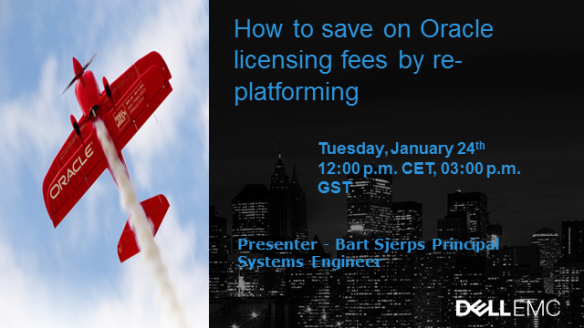On Jan 24th, I will host a webcast on Oracle cost optimization via database replatforming.
Database license fees drive over 80% of total system cost. Many organizations virtualize their applications, but Oracle is often an exception for a variety of reasons.
You will learn why re-platforming Oracle databases on better hardware can drive down TCO by a significant amount. Bart will also cover technical challenges and benefits, as well as myths and facts about licensing Oracle on VMware, and how to deal with Oracle license audits and still stay compliant.
The presentation will be a mix of technical as well as IT management level content, and will discuss how to use Dell EMC platforms with or without virtualization, to optimize database license cost. I will also cover common myths, gotchas and workarounds for licensing issues.
Keith Dobbs, our guest speaker from Madora Consulting, will cover more interesting insights in Oracle licensing, audits and negotiations.
We already have nearly 200 registrations but there is always room for more, so click on the picture below to register:

Webcast
See you there on Tuesday!
Update: The presentation is available via the Presentations page
This post first appeared on Dirty Cache by Bart Sjerps. Copyright © 2011 – 2017. All rights reserved. Not to be reproduced for commercial purposes without written permission.




 In previous posts I have focused on the technical side of running business applications (except my last post about the Joint Escalation Center). So let’s teleport to another level and have a look at business drivers.
In previous posts I have focused on the technical side of running business applications (except my last post about the Joint Escalation Center). So let’s teleport to another level and have a look at business drivers.
